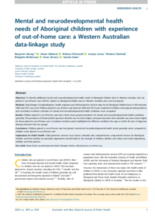Objective:
To identify additional mental and neurodevelopmental health needs of Aboriginal children born in Western Australia, who are placed in out-of-home care (OOHC), relative to Aboriginal children born in Western Australia who were not placed.
Methods:
Data-linkage of hospitalisations, health registries and child protective services data for all Aboriginal children born in WA between 2000 and 2013 was used. Children placed in out-of-home care between 2000 and 2019 were matched to children never placed and prevalence and cumulative incidence estimates of mental and neurodevelopmental health conditions were compared.
Results:
Children placed in out-of-home care had a three times greater prevalence of mental and neurodevelopmental health conditions generally. The prevalence of foetal alcohol spectrum disorder was ten times higher, and post-traumatic stress disorder was seven times higher for those placed in out-of-home care. Cumulative incidence plots highlighted for different conditions the ages at which the rate of diagnosis diverges between the two groups.
Conclusions:
Children placed in out-of-home care had greater mental and neurodevelopmental health needs generally when compared to children never placed in out-of-home care .
Implications for Public Health:
Child protective services must ensure culturally safe, comprehensive, wrap-around services for Aboriginal children and their families are provided. Approaches should build on the strength of children, families and culture and avoid stigmatising children and their parents.

